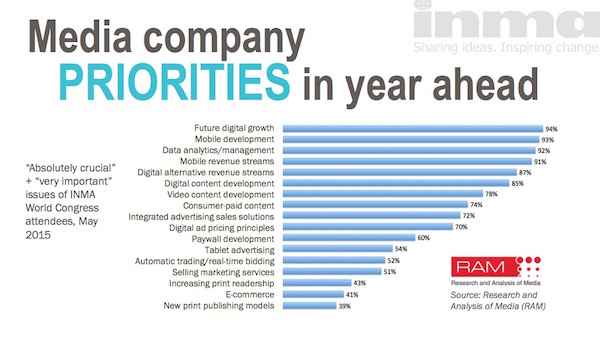Facebook’s Instant Article and the future of news.
Last week, the ubiquitous social media giant Facebook announced that it had launched a mobile app called Instant Articles wherein news stories provided by a number of partners can be read in their entirety by iPhone users. Those who download the app will crucially be spared the inconvenience of clicking on a link in their usual newsfeed which may take up to ten seconds to direct to another webpage. For news publishers, it means a visible brand presence on Facebook going some way beyond the present practice of posting excerpts from articles and a link to the website. For Emily Bell , director of the Tow Center for Digital Journalism at Columbia University’s Graduate School of Journalism, this is a vastly important development. She wrote:
“for the publishing industry this is the most significant moment of the past few years. It crystallises what has been happening since the invention of the iPhone, and that is a move towards producing quickly accessible material which can be viewed through a very small, responsive screen.”
When the app went live on May 13th it did so in collaboration with the New York Times, BuzzFeed, National Geographic, NBC News and The Atlantic who each contributed articles. Also signed up to trial the product (with their first content to be run later this summer) are the British media titans BBC News and the Guardian, together with Germany’s Bild and Der Spiegel. It’s unlikely that they will be alone for long, however. Troy Young, president of Hearst Magazines Digital Media, which publishes Cosmopolitan, told Lucia Moses: “Obviously our brands will be in there, it’s just a matter of time.” As Moses stated, Time Inc., CNN and other global publishers are expected to begin posting their content directly to the platform themselves in the coming months.
And why wouldn’t they? At first glance the commercial opportunities that Facebook is going to provide seem ludicrously and uncharacteristically benevolent. At the unveiling of Instant Articles, Michael Reckhow, Facebook’s product manager said that the initiative would, ‘give publishers control over their stories, brand experience and monetization opportunities’. Vitally, publishers would have the ‘ability to track data and traffic through comScore and other analytics tools.’ Facebook Chief Product Officer Chris Cox also said: “Instant Articles lets them [publishers] deliver fast, interactive articles while maintaining control of their content and business models.” What this also means is Facebook allowing the likes of NBC and the Guardian to retain 100% of the revenue raised from ad sales around articles, together with the oh so valuable data on the people reading the stories.
What Facebook gets, according to Matthew Ingram, is the opportunity to ‘deepen and strengthen its hold on users.’ Ingram and others argue that Instant Article is a means to an end – the way that Facebook can consolidate its existing position and eventually be the major platform where the world’s population goes to get its news. And it’s well on its way to that goal – according to research published last year , 71% of online American adults use Facebook with about one third going there for news stories. Add to this the fact that nearly half of Americans with internet access have signed up for news alerts and the astonishing growth in mobile technology. The American Media Insight project recently found that among smartphone owners, 78% reported using their device to access news.
Facebook, as we know, is a massive online entity whose figures for 2014 indicate 1.32 billion people who log on each month, generating annual revenue of $2.91 billion. Its position has never been stronger – as Ellis Hamburger reported – in the second half of 2014 Facebook’s year over year revenues were up roughly 60 percent and its profits more than doubled. It’s also committed to expansion. In 2013, the co-founder and CEO of the company, Mark Zuckerberg wrote
“For nine years, we’ve been on a mission to connect the world. We now connect more than 1 billion people, but to connect the next 5 billion we must solve a much bigger problem: the vast majority of people don’t have access to the internet”.
It’s this desire to ‘take over the internet’, this position of power and considerable financial weight that deeply concerns many media analysts. As Liam Mirani helpfully summarises, the arguments against publishing journalism directly on Facebook are many. They include news outlets giving up their own distribution channels and offering too much control to Facebook. There is the danger of being at the mercy of ‘the whims of mysterious algorithms,’ then there is precious reader data effectively being given away – to say nothing of having to worry about potential censorship.
Those publishers already involved in the project (publically at least) see only the positives. Mark Thompson, President and CEO, The New York Times Company said
“The New York Times already has a significant and growing audience on Facebook. We’re participating in Instant Articles to explore ways of growing the number of Times users on Facebook, improving their experience of our journalism and deepening their engagement.”
Tony Danker International Director, Guardian News & Media was similarly as effusive. He said:
“It is great to see Facebook trialing new ways for quality journalism to flourish on mobile. The Guardian is keen to test how the new platform can provide an even more engaging experience for our readers. It is then vital that, over time, Instant Articles delivers recurring benefit for publishers, whose continued investment in original content underpins its success.”
The clear power and size of Facebook notwithstanding, as far as the future of journalism is concerned its Danker’s allusion to the ‘continued investment in original content’ which is the key – because in many ways it could be argued that what is happening with Instant Articles is simply part of an ongoing process. As Timothy B Lee makes clear, the individual sites at places like the Guardian are not going to become extinct and plenty of existing media companies already use YouTube and Facebook video to deliver video to consumers. Lee writes:
“No one thinks it’s a threat to journalisms when newspapers syndicate one another’s articles. The value of a New York Times article is in its content, not the design of the webpage that surrounds it”
The smart money will tell you that Instant Article will soon move beyond iPhone only access and the 9 mega companies already signed up. Unprofitable paywalls will become obsolete as the world’s major media players shift their areas of strategic importance. Two weeks ago the International News Media Association World Congress gathered in New York where future areas of priority were identified. The table below provided by the Nieman journalism Lab points us clearly toward a digital and mobile future.

A shorter version of this post appears here.

